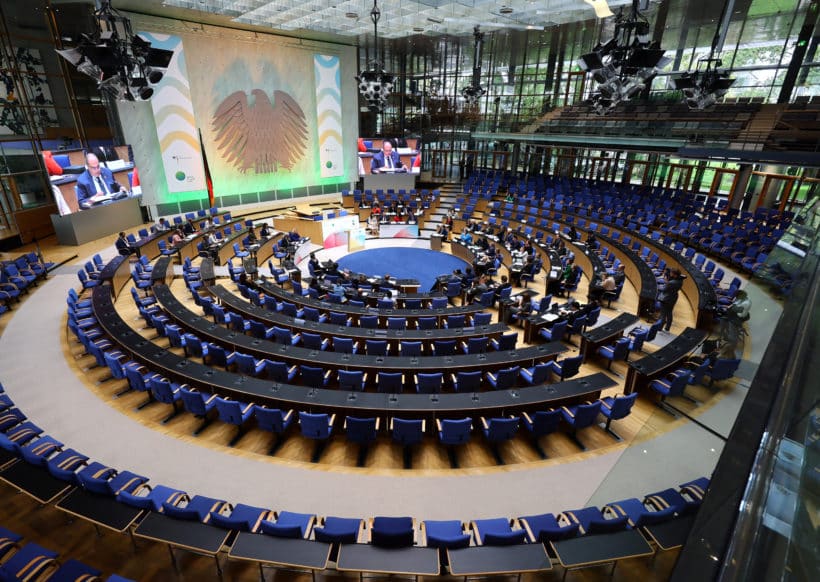
BERLIN/BRUSSELS, Oct 5 (Reuters) – The United Nations’ main fund for helping vulnerable countries cope with climate change said on Thursday it had raised $9.3 billion, falling short of a $10 billion target after wealthy nations, including the United States, failed to pay in.
The amount represents just a fraction of the $200 billion – $250 billion that developing countries will need every year by 2030 to adapt to climate change, according to an estimate given Wednesday in a U.N. Framework Convention on Climate Change report that showed how the costs of preparing for climate impacts and the damages from extreme weather events continue to mount.
With the U.N.’s COP28 climate summit set to begin in less than two months in Dubai, pressure is ramping up for wealthy governments to make good on promises to help developing countries prepare for and cope with climate change.
A climate funding conference in Bonn, Germany, on Thursday saw a handful of countries add cash to the Green Climate Fund – the U.N.’s main funding arm for dispersing climate finance.
Among those donating were Japan, which said it would contribute up to 165 billion yen ($1.11 billion) over 2024-2027, and Norway, which offered around $300 million.
There were no new funding pledges made from the world’s top two polluters, the United States and China.
A U.S. representative said the country was not in a position to pledge due to uncertainty in its domestic budget process, but was “working on” an announcement. China, meanwhile, has yet to agree to join wealthy countries in providing climate finance through the U.N. system.
Australia, Italy, and Sweden said they also were also working on contributions, but did not make pledges on Thursday. The Green Climate Fund (GCF) is aiming to exceed the $10 billion in contributions it raised in its last three-year round.
Mahmoud Mohieldin, the fund’s facilitator said he expects the top-up to comfortably surpass the last contribution round once the countries that promised funds announce their pledges.
“If these countries just came with what is expected and some of them of what they contributed last time with a slight increase … we’ll be in that safe zone,” Mohieldin told Reuters on Thursday.
‘WE ARE STILL WAITING’
Germany, Britain, France and Japan are the biggest backers so far of the UN fund, which was set up to channel money to help poorer nations meet their targets to reduce CO2 emissions, develop clean energy and adjust to a warming world.
“I also increasingly see countries that are not traditional donors as having responsibility: for example the Gulf states, which have become rich from fossil fuels, or emerging countries like China,” German Development Minister Svenja Schulze said at the conference.
But GCF’s Mohieldin said the Gulf countries should be encouraged and incentivized to contribute rather than pressured, citing the fund’s mandate where developed countries voluntarily offered their commitment without pressure based on the Common but Differentiated Responsibility principle.
“China has its own way of doing business … But I’m not expecting China to contribute in this cycle,” he added.
The UN’s official list of nations that should provide climate finance – which dates back to 1992 – includes only a few dozen wealthy countries.
The issue of climate funding is set to dominate this year’s UN COP28 climate summit, which begins in November in Dubai.
There, countries plan to launch a new international fund dedicated to supporting vulnerable nations where climate change is causing irreversible damage. Traditional donors, including European nations and the United States want a bigger pool of countries to pay in.
David Ryfisch climate policy expert at campaign group Germanwatch said the Green Climate Fund tally on Thursday was disappointing and a “poor signal” ahead of COP28.
“Climate finance in general is a big trust enabler or also trust eroder when it comes to the climate negotiations,” he said.
Hanging over this year’s UN climate talks is a still-unmet pledge that rich nations made in 2009, to by 2020 deliver $100 billion in climate finance each year. Countries have said they expect to be able to meet it this year.
“We are still waiting for delivery of the $100 billion per year promise of climate finance,” said Madeleine Diouf Sarr, chair of the Least Developed Countries group in UN climate negotiations, adding that in the group’s view, success at COP28 will hinge on countries launching and putting money into the new climate damages fund.
“An empty loss and damage fund won’t do anything for our people,” she said.
($1 = 148.9700 yen)
(Reporting by Riham Alkousaa and Kate Abnett; Editing by Susan Fenton, Katy Daigle, Mark Potter and Aurora Ellis)